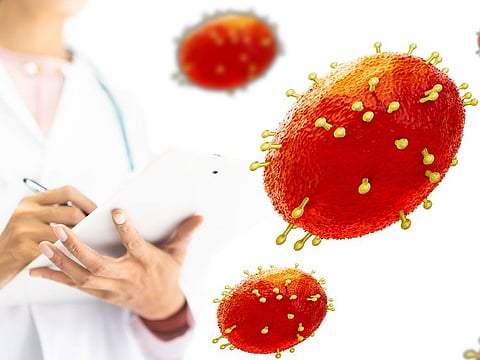Monkeypox outbreak: Abu Dhabi, Dubai urge health authorities to monitor virus spread
Health authorities around the world closely tracking the spread of monkeypox virus

Dubai: The Dubai Health Authority (DHA) has urged all health authorities in Dubai to enhance the epidemiological investigation of the monkeypox, which has spread across several countries.
In a circular issued today, the authority called on all competent authorities in the emirate to early detect and investigate the virus to reduce the risk of its spread, effectively implement prevention measures and control the potential sources of infection.
Also Read: Canada confirms first two monkeypox cases
The authority called on all concerned entities to comply fully with the circular instructions to avoid any legal accountability.
Abu Dhabi isuess advisory
The Department of Health - Abu Dhabi has also urged all healthcare facilities operating in the emirate to be vigilant about any suspected or confirmed Monkeypox cases.
The alert comes in line with the DoH regular assessment towards the global healthcare landscape.
In a statement issued on Friday, the department of health said: “All healthcare providers are required to report any suspected, probable or confirmed case in the Infectious Disease Notification System as part of the measures to manage and limit the infectious diseases for the health and safety of the community”.
What's Monkeypox?
Monkeypox is a relative of smallpox, a disease that was eradicated in 1980, but is less transmissible, causes milder symptoms and is less deadly.
The illness typically lasts for two to four weeks and symptoms can appear anywhere from five to 21 days after infection.
Monkeypox symptoms usually begin with a mix of fever, headaches, muscle aches, backache, chills, exhaustion, and swollen lymph nodes.
This latter symptom is typically what helps doctors distinguish monkeypox from chickenpox or smallpox, according to the WHO
A viral zoonotic disease
Monkeypox is a viral zoonotic disease caused by a virus belonging to the Orthopoxviral genus in the Poxviridae family and transmitted from infected animals to humans. Primarily, the disease occurs as infections in the tropical rainforest area of Central and West Africa. The first human monkeypox infection case was discovered in Africa in 1970.
Animal-to-human Monkeypox virus transmission occurs from direct contact with blood and bodily fluids. The Human-to-human transmission is limited and can result from close contact via respiratory particles droplets that require prolonged face-to-face contact, in addition to transmission possibility upon contact with surfaces contaminated with patient fluids.
Typically, the disease begins with general symptoms characterised by fever, myalgia (muscle aches), intense headache, lymphadenopathy (swelling of the lymph nodes), followed by skin eruption that concentrates on the face and then spreads to other body parts.
The incubation period of monkeypox is usually from 6 to 16 days and symptoms last from 14 to 21 days.
Due to the transmission mode and the endemicity of the virus in certain parts of Africa, its human-to-human transmission is considered limited and within the range of direct contact with the patient or contaminated fluids.
Sign up for the Daily Briefing
Get the latest news and updates straight to your inbox



